13 F. high at St. Cloud Wednesday.
30 F. average high on February 25.
4 F. high on February 25, 2014.
1" snow on the ground at KSTC.
February 25 in Minnesota Weather History. Source: Twin Cities National Weather Service.
1996:
A bolt of lightning from a snowstorm causes an explosion at a fireworks
storage site in Milaca. One employee was injured and several homes in
the area were damaged. An eight foot crater was all that remained where
the storage site had been.
1971:
Extremely low pressure moves across Minnesota. The Twin Cities had a
barometer reading of 28.77 inches and Duluth beat that with 28.75.
Freezing rain and snow hit northern Minnesota, dumping up to 18 inches
in some areas. Areas around Virginia were without power for 5 days.
1896:
A balmy high of 60 degrees was reported at Maple Plain. The warm
weather hampered the annual ice cutting on Lake Independence to store
for summer use.
Fluke or Trend?
At
last report The Weather Channel was up to "Juno". At the rate we're
going we may get to "Zeus" and then start at the beginning of the
alphabet. Personally, I'm dreading Winter Storm "Bubba".
From
Boston to Dallas; every day there's new video, a litany of records -
breathless reporting. Are big winter storms really on the increase? Or
has perception become reality, thanks to Twitter and a flood of media
outlets?
A recent
NOAA/UCAR paper
(Bulletin of the American Meteorological Agency) concluded: "For severe
snowstorms and ice storms the number of severe regional snowstorms that
occurred since 1960 was more twice that of the preceding 60 years."
This is a bigger factor for New England and the East Coast, where warmer
water offshore enhances water vapor - meaning more fuel for storms that
do spin up, leading to heavier snowfalls.
Light snow may brush
Minnesota next Tuesday, otherwise the forecast calls for ditto, any big
storms with names sliding south of Minnesota - a cold, dry northwest
wind flow blowing overhead.
I don't see any extended thaws until
mid-March, when it may be warm enough for rain. And to Pete, who I sold
my 2 snowmobiles to: I'm sorry - I had no idea we'd see so little snow.
Next winter will be better, right?
* My friend and meteorologist at WDIV-TV in Detroit, Paul Gross, informs
me that five of Detroit's top ten all-time snowiest winters (since
1870) have occurred in the past eleven years.
When In Doubt Forecast A Cold Front.
By late February a higher sun angle limits how cold it can get,
especially with only an inch of snow on the ground. Expect single-digit
highs today with a subzero wind chill. But the sun will be out, and that
may help (at least a little). By the weekend temperatures moderate into
the 20s. Progress! 2-meter NAM predicted temperatures: NOAA and Ham
Weather.
Son of Polar Vortex?
Which makes for a grabby headline, but it's not valid. This is just
cold Canadian air; the pattern still not even close to the odd holding
pattern of last winter, where a frigid cut-off low stalled for the
better part of 2-3 months east of Hudson Bay. Temperature anomalies
valid midday today show the core of cold air passing over the Midwest,
while most of the northern hemisphere trends warmer than average; Arctic
temperatures still over 4F milder than average.
Temperature anomalies obtained using Climate Reanalyzer (http://cci-reanalyzer.org), Climate Change Institute, University of Maine, USA.
Getting Better.
No abrupt surges of Pacific warmth are imminent looking out 10 days or
so, but we will see readings a little closer to average early next week.
The best chance of light snow over the next week comes next Tuesday,
but once again the bulk of any precipitation passes south of Minnesota.
Getting to be a habit.
A Cruel Trick?
GFS guidance prints out a shot at low 40s by March 9, after a couple of
subzero mornings March 5 and 6 (late next week). This solution looks
reasonable to me. Spring is coming, but winter is in no great hurry to
vacate the premises. Extended temperature prediction: Ham Weather's
Aeris Enterprise.
North Shore Experiencing Worst Ski Weather in 100 Years.
Speaking of a lack of snow, resorts north of Vancouver, Canada have
shut down due to unseasonable warmth and a lack of the white stuff.
CTV Vancouver News has more details; here's an excerpt: "...
The
dismal ski season on the North Shore Mountains is being called the
worst in a century, and climatologists warn bare slopes could become the
norm. Seymour, Grouse, and Cypress are all lacking in snow, a
disappointing sight for local skiers and international tourists who
travelled thousands of kilometres to enjoy the popular hills. Scientists
see the conditions as a statistical anomaly – a one-in-33-year
occurrence – but projections suggest there will be more and more of them
as the decades pass..."
Image credit above: "
Bare ski runs on Cypress Mountain are seen from CTV's Chopper 9 helicopter. Feb. 24, 2015."
Minnesota's Biggest Polluters Spending Over $10 Million to Pollute Politics.
Environment Minnesota has the press release, here's an excerpt that caught my eye: "...
Right
now, polluters are lobbying their allies on Capitol Hill to derail
EPA’s plan to restore Clean Water Act protections to 47,000 miles of
streams in Minnesota. Loopholes in the law currently leave the waterways
that feed the drinking water for 970,000 at risk. “When powerful
special interests spend millions to influence our elections and lobby
decisionmakers, they drown out the voices of everyday Americans.” said
Minneapolis City Council Member Cam Gordon. “To make sure we’re able to
protect our environment and our health, we need reforms to stop the flow
of big money into politics....”
Don't Weather-Shame Washington D.C. Here's an excerpt of an interesting story at
U.S. News and World Report: "...
This isn’t a battle of toughness. This is a loudly clanging warning about climate change. The world is indeed getting warmer – 2014 was the warmest year
in modern history – and severe weather patterns are a consequence of
that. No, we can’t blame any of Boston’s snowstorms, individually, on
climate change, any more than a heart attack victim can attribute the
event to the double cheeseburger eaten the previous day. This is about
long-term, sustained changes in climate and weather. The number of
severe, regional snowstorms since 1960 is more than double that of the
previous 60 years, according to a report in the Bulletin of the American Meteorological Society. Where will it be in 60 more years?..." (File photo: AP).
* The research paper referenced above is
here, courtesy of UCAR.
8 Foods That Help Improve Your Memory.
Details
has the article - what I would give to take a daily memory pill, in the
meantime I'm trying to get more salmon in my diet after reading the
story; here's an excerpt: "...
Forgot what you're looking for? Bad
with names? Writing down a lot of lists but then misplacing them? Like
most people, you're experiencing some memory loss—and growing older
doesn't help matters. Luckily, researchers all over the world are
scouring the earth looking for ingredients that might organically
improve human recall. Scan the menu of ingredients below and, if you
make the right diet changes, you too could develop a champion's memory..."
Fact-Checking Grandma.
Aeon
reports that the Internet is rife with myths, scams, and hoaxes. Yep.
When any claim can be checked out, why does fiction still trump fact?
Here's an excerpt: "...
In 2012, Jonah Berger and Katherine Milkman,
both at the Wharton School of Business at the University of
Pennsylvania, analysed 7,000 articles from The New York Times to assess
what made stories go viral. What they discovered was that stories which
elicited strong emotion – both positive and negative – were the ones
that got shared most often. People believe the stories that they connect
to, the ones that affirm their view of the world, truth be damned..."
A Thirsty, Violent World. The author of the article at
The New Yorker
argues that we can and will find substitutes for oil and natural gas -
as resources become scare substitutes often take their place. Clean
water? Not so much. Here's an excerpt: "...
Rapid climate change,
population growth, and a growing demand for meat (and, thus, for the
water required to grow feed for livestock) have propelled them into a
state of emergency. Millions of words have been written, and scores of
urgent meetings have been held, since I last wrote about this issue for
the magazine, nearly a decade ago; in that time, things have only grown worse.
The various physical calamities that confront the world are hard to
separate, but growing hunger and the struggle to find clean water for
billions of people are clearly connected..."
Mapped: These Are The Quietest Spots in America. Northern Minnesota is looking pretty good in the quiet-category; here's an excerpt of a story at
Quartz: "...
Researchers
used sound data collected from 546 sites around the US over the past 10
summers, then estimated the noise levels in the remaining areas based
on factors like population density, roadway sizes, and proximity to
airports, Fristrup tells Quartz..."
Map credit above: "The dark blue areas are the quietest, and the yellow to white are the loudest.
" (National Park Service, Natural Sounds & Night Skies Division).
Urbanization and Smartphones are Killing Car Culture.
Will our grandkids care as much about owning a car, or will we have
better options, more mass transit, an Uber-mindset of rent vs. buy? Who
knows, but
CityLab takes a look at the trends: "
The
Western world's century-old love affair with the automobile is coming
to an end. People are driving less than they did before the recession,
and there are fewer cars on the road. In the U.S., the number of
vehicles per driver has fallen from a peak of 1.2 in 2007 to 1.15 today,
according to data compiled by Schroders, an asset management firm.
Young Americans are getting their drivers' licenses later than they did
in 1983, or even in 2008..."
100" of Snow? No Problem for Boston Bikers. Even Old Man Winter can't stop cyclists in the Boston area, as described in an article at
BDCwire; here's a clip: "
Along
the Malden and Mystic Rivers sits the Wellington Greenway, a hiking and
biking path that leads users from Boston’s inner harbor into Medford.
It’s quite popular with commuters at the Wellington Station T stop on
the Orange line. However, snow removal efforts by the MBTA blocked the
path with a gigantic mountain of snow, rendering it all but accessible.
That is, until a few local cyclists took matters into their own hands..."
TODAY: -25 to -30 wind chill early. Bright sun. Winds: NW 10-15. High: 6
THURSDAY NIGHT: Clear and plenty cold. Low: -13
FRIDAY: Blue sky, less wind. Still nippy. High: 16
SATURDAY: Breezy, coating of snow at night? Wake-up: -4. High: 21
SUNDAY: More clouds than sun, colder. Wake-up: 10. High: 25
MONDAY: Partly sunny, no travel headaches. Wake-up: 8. High: 27
TUESDAY: Chance of light snow. No big deal. Wake-up: 14. High: 26
WEDNESDAY: Cloudy and cool. Still cooler than average. Wake-up: 12. High: 25
Climate Stories...
Climate Change Will Hit America in the Breadbasket. NBC News has the story - here's an excerpt: "...
Theoretically, reduced production along the southern edge of the country's grain-producing regions should be offset by increased production along the northern edge. The Corn Belt (and Soybean Belt) is already pushing up past the Canadian border,
and Canada's wheat-producing zone is creeping farther north. But in
reality, the shift is still likely to produce a net loss in crop
production, said Jerry Hatfield, director of the USDA-ARS National
Laboratory for Agriculture and the Environment..." (File photo: Star Tribune).
Sea Levels in Northeast Jumped 5 Inches In Just 2 Years, Study Says.
Some of this is sea level rise, some is land subsidence, but the net
effect is clear; higher water levels are making coastal storms even more
damaging, especially when you superimpose a storm surge and surface
waves on top of the rising Atlantic. Here's an excerpt from a story at
Mashable: "
Sea
levels in northeastern North America jumped by more than five inches in
a two-year period between 2009 to 2010, a rate unprecedented in the
history of tide gauge records, a new study found. The study,
published Tuesday in the journal Nature Communications, found that the
temporary acceleration in long-term sea level rise resulted in coastal
flooding and beach erosion along the Northeast coast from New York
northward to Atlantic Canada..."
Sea Spike Details. Here's an excerpt from the new research referenced above via
Nature Communications: "...
The
analysis of long-term tide gauge records identified an extreme
sea-level rise (SLR) event during 2009–10. Within this 2-year period,
the coastal sea level north of New York City jumped by 128 mm. This
magnitude of interannual SLR is unprecedented (a 1-in-850 year event)
during the entire history of the tide gauge records..."
Democrats Target Climate-Deniers-For-Hire.
New Republic has the details; here's an excerpt that caught my eye: "...
The
goal of the investigation is to "establish the impartiality of climate
research and policy recommendations," writes Grijalva. "Companies with a
direct financial interest in climate and air quality standards are
funding environmental research that influences state and federal
regulations and shapes public understanding of climate science. These
conflicts should be clear to stakeholders, including policymakers who
use scientific information to make decisions..."
The Remote Alaskan Village That Needs To Be Relocated Due To Climate Change. A preview of coming attractions from Louisiana to south Florida and Virginia? Here's a snippet from a
Washington Post story: "..
The question now facing the town, the state of Alaska, and the nation is whether to move the people of Kivalina to a safer location nearby, either inland or further down the coast — and who would pay upwards of a hundred million dollars to do it. It’s a question already facing Kivalina and a handful of other native Alaskan villages, and in the coming decades could apply to numerous other towns along U.S. coastlines..."
Relocation Costs.
The U.S. Army Corp of Engineers takes a look at how much it might cost U.S. taxpayers to move an entire town along the coast of Alaska.
With Climate Change U.S. Presidents Matter. St. Thomas climate scientist John Abraham has the story for
The Guardian; here's a clip that caught my eye: "...
Vetoing
this pipeline, which would increase the rate of extraction of the
world’s dirtiest fuels (bitumen and the byproduct petroleum coke), was a
no-brainer for anyone concerned about climate change. In fact, it is
not possible to be in favor of the Keystone pipeline if you accept the
science of climate change. The reason this story is so big isn’t just
about carbon dioxide emissions (although that matters). It is more about
the strong stand taken by the President against a well-funded campaign
to force the pipeline through. It is also important because of the
signal it sends to those intent on long term dirty-fuels extraction..."
 Lester Brown: "Vast Dust Bowls Threaten Tens of Millions With Hunger"
Lester Brown: "Vast Dust Bowls Threaten Tens of Millions With Hunger".
The Guardian has details; here's a clip: "...
Vast
tracts of Africa and of China are turning into dust bowls on a scale
that dwarfs the one that devastated the US in the 1930s, one of the
world’s pre-eminent environmental thinkers has warned. Over 50 years,
the writer Lester Brown has gained a reputation for anticipating global
trends. Now as Brown, 80, enters retirement, he fears the world may be
on the verge of a greater hunger than he has ever seen in his
professional lifetime. For the first time, he said tens of millions of
poor people in countries like Nigeria, India, Pakistan and Peru could
afford to eat only five days a week..."
My Depressing Day With A Famous Climate Skeptic. NPR reports, here's an excerpt: "...
I
came away from my meeting with this famous climate skeptic feeling
pretty depressed. What I had seen was a scientist whose work, in my
opinion, was simply not very good. That, on its own, is no big deal.
There are lots of scientists whose work is not very good — and some
people may even think my science should be included in that list. But
Soon's little string of papers were being heralded in the highest courts
of public opinion as a significant blow to everyone else's
understanding of Earth's climate. From TV studios to the halls of
Congress, we were being told his was world-shaking research of the
highest caliber, and that we had to take notice..."
Investors, Science Group Pressure Oil Companies to Disclose Climate Climate Risks. Here's an excerpt from the UCS,
the Union of Concerned Scientists: "
Five
major oil and gas companies aren’t doing enough to disclose risks from
climate change to the U.S. Securities and Exchange Commission (SEC),
including sea level rise and storm surge, according to a new report
from the Union of Concerned Scientists (UCS). Several investment
groups, including Calvert Investments Management, joined UCS and Ceres
today in sending letters to the five companies—Chevron, Exxon Mobil,
Marathon Petroleum, Phillips 66, and Valero—expressing concern about
these risks. Calvert has also filed a shareholder resolution with Phillips 66 urging the company to disclose climate risks..."
Can Only Republicans Help Republicans on Climate Change? Here's a snippet of an Op-Ed at
The Washington Post: "...
A
more useful option than simply doing more research is for Republican
politicians who know better to start behaving more responsibly. Opposing
even the simplest, most market-oriented climate policies has to stop
being a signifier of conservative tribal allegiance. But it will be very
tough for those outside the GOP tribe — independent scientists, climate
activists, Democrats — to fight the cultural politics that have made
the climate debate intractable. Their efforts might even deepen the
divide..."
Burst of Warming May End Lull in Rising Temperatures.
New Scientist has the article - here's an excerpt: "...
Global
mean surface temperatures have not risen significantly since about
1998, which could be thanks to the oceans sucking up the extra heat. If
this turns out to be the case, Chris Roberts
from the Met Office in the UK and colleagues have found that there is a
60 per cent chance the hiatus will be followed by a five-year period of
rapid warming at twice the usual background rate of around 0.2°C per decade. The models also suggest there is a 15 per cent chance the hiatus will continue for five more years..."

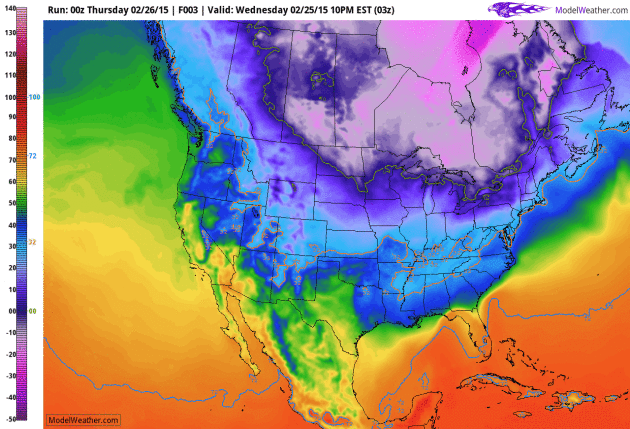
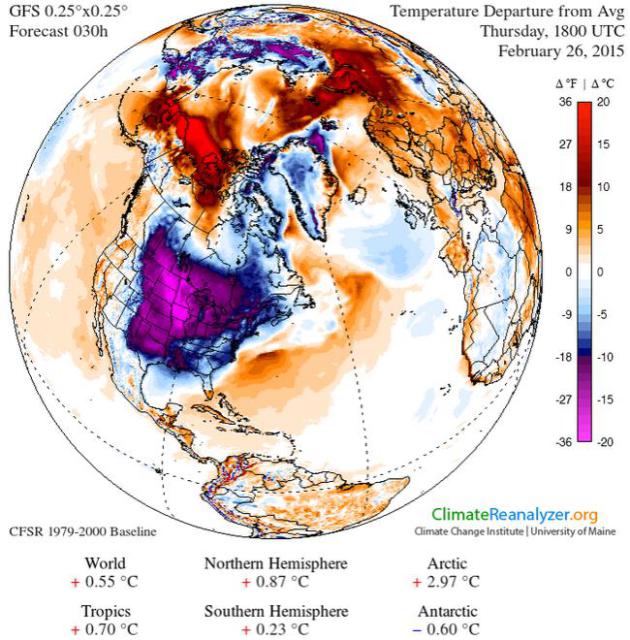
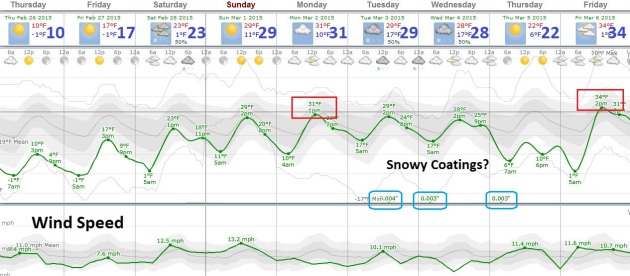

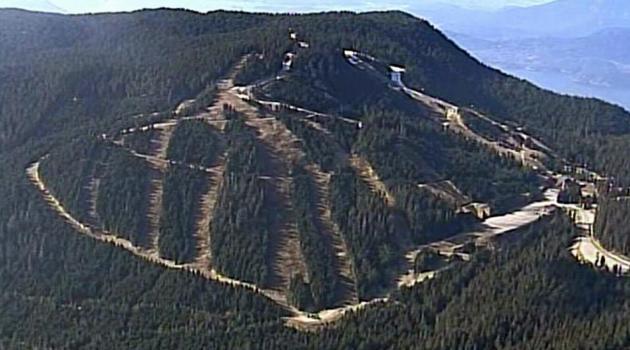

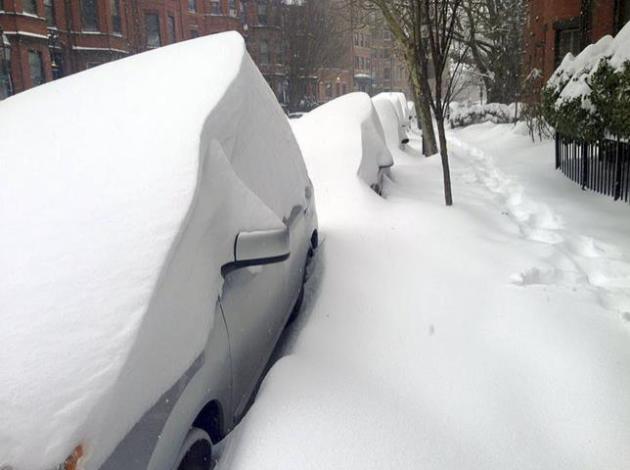


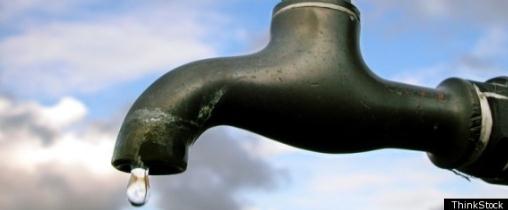
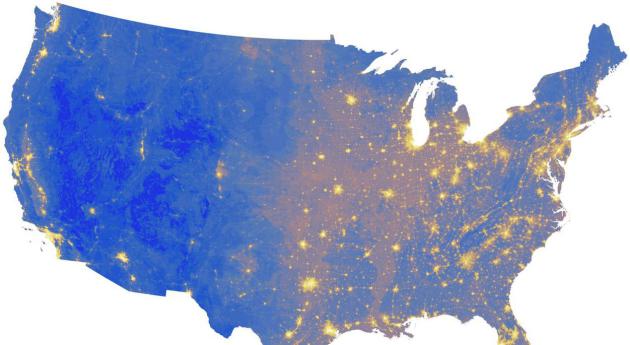

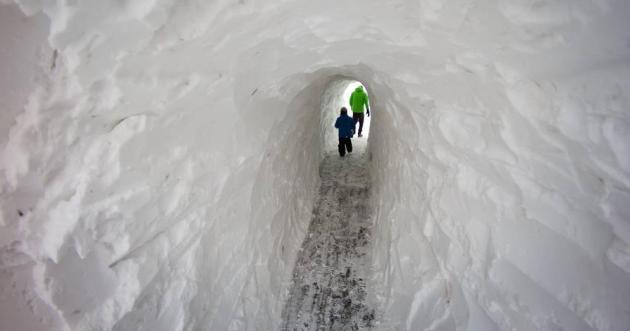

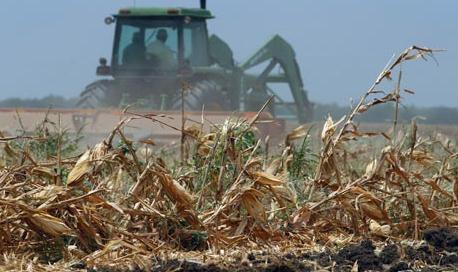
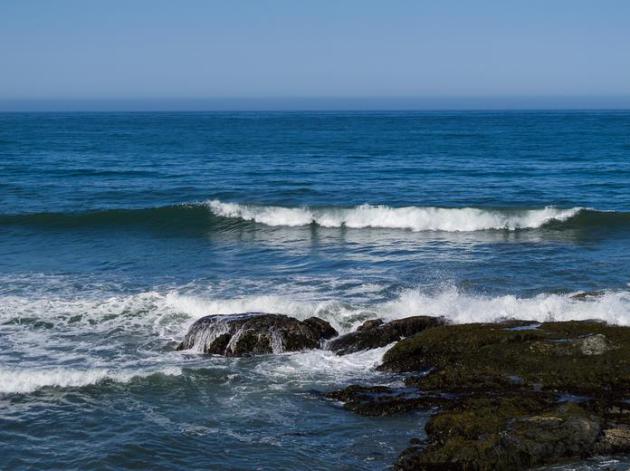
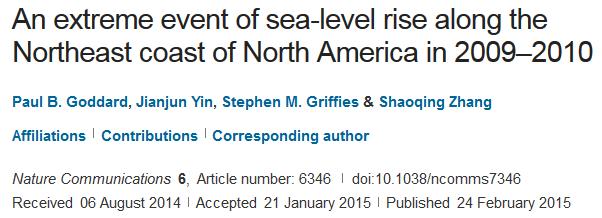
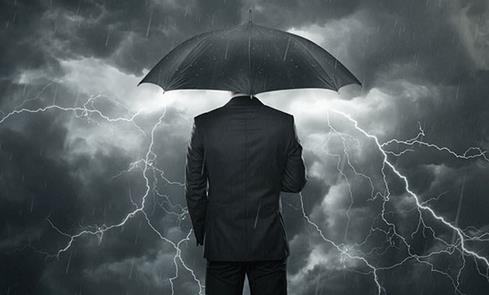
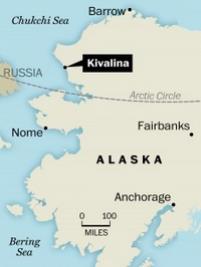
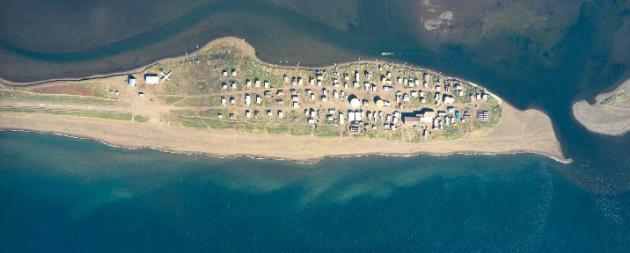
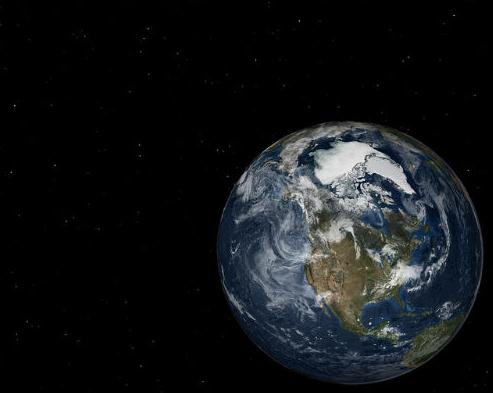
.jpg)



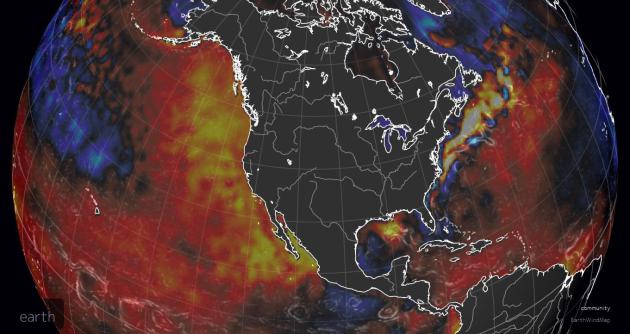
No comments:
Post a Comment